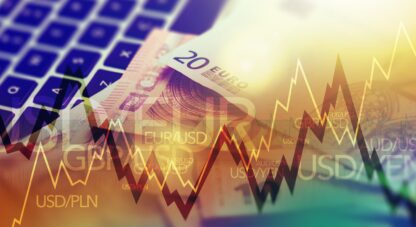About this week’s show:
- Greece: Default or pay in Drachma?
- India: “Give us your gold and we’ll pay interest.”
- “FLASH CRASH” foreshadowing crises in bond market
The McAlvany Weekly Commentary
with David McAlvany and Kevin Orrick
“Bankers choose to take on unreasonable risks, really, on the belief that they have political influence, or political connections, sufficient to prevent taking a loss, and so they over lend. They lend too much, thinking that there really is no cost in the marketplace to do so. And yes, that is back to that whole notion of socializing the cost of what up to that point had been privatized profit.”
– David McAlvany
Kevin: There is an indicator that you use, and many people use, actually, to see if the stock market is overvalued, and it is not the points on the stock market – 18,000 points, or what have you. It actually has to do with the amount of margin debt that people are taking out to buy those stocks.
David: One way of looking at any market is to ask the question, “How many buyers are in line to buy that particular asset?” Or, “How many sellers are in line?” And you know you’re at the cusp of a major turn going the other direction when you run out of buyers, or when you run out of sellers. So, you sell an asset until it declines to virtually nothing, and when you run out of sellers, that asset will begin to appreciate.
Kevin: Yes. When everybody is playing already and there is no one else to come into the market, then you could be topping out.
David: And that’s why I think the margin debt is really indicative, because not only is it a question of how many buyers are in line, but what is the quality of the buyer? And in this case you are dealing with someone who is using someone else’s money, which means they don’t really have the same security in the purchase that you might if you were putting your own cash on the barrel, so to say.
Kevin: Let’s go back in history, then. 1929 was a major crash. We had a major crash in 2000. We had a major crash in 2007-2008. Where was margin debt relative to the capitalization of the stock market at those junctures?
David: 2% to 2.5% is what has been considered excessive. As you move toward greater than 2%, toward 2.5%, you are really, to use an analogy from the auto world – you are redlining. The fact that today we are closer to 3%, 464.9 billion – we increased 20 billion in the month of February, which was the most recently recorded numbers – that puts us within a stone’s throw of the previous peak, which was February 2014 at 465 billion. So, literally, we are less than a quarter percent away from the all-time high, that is, the all-time high, both in terms of percent relative to capitalization, as well as just raw, nominal numbers.
Kevin: So we’re at all-time highs right now, or close to all-time highs, on margin debt as a relation to capitalization of the stock market. But Dave, Asia has been going wild. The stock market in Asia right now has doubled in Shanghai over the last year.
David: Right. And I think the particularly disturbing point there is that their margin financing of purchases in the stock market is twice what ours is. We are near 3%, which is an all-time record for us, and they are closer to 6%, again, comparing the total debt, and the much smaller, of course, stock market capitalization there in Shanghai.
Kevin: Why wouldn’t you go into debt and buy stocks, Dave? I mean, it’s the guaranteed return. Isn’t the Federal Reserve right now, and the central bank control, almost guaranteeing return in that one area? Yet in the same area they are keeping interest rates at virtually zero.
David: This is where you see a difference between someone who is managing money on an intergenerational basis, and people who might have been flipping burgers last week and now are flipping stocks this week. Institutions, as we speak, are dumping stocks in China. Billions of dollars are being handed over to the general public to hold onto, and to have and to hold for however long they are going to. And this is, I think, what is lost on the general public. About the time there is enthusiasm, and it seems like it is a guaranteed win, you have to look where the smart money is and what the smart money is doing.
And so, to see investors dumping billions of dollars, exiting the Hong Kong and Shanghai markets completely — number one, that is not a good indicator, and number two, you are also seeing companies in Hong Kong and Shanghai do secondary offerings, which is to say, they have so much stock outstanding, now they are going to issue even more stock because the demand for their company is so high, they are feeding an animal frenzy. And I think that, again, if it is bad here, in terms of the animal frenzy to buy stocks, it is even worse in Asia, and it doesn’t speak well to the immediate stability in that market.
Kevin: Well, Dave, there is more than one way to skin a cat, or to make a stock go up, because revenues are declining for IBM, the Big Blue. And yet, the stocks are doing well.
David: No listed company in the United States is as skilled at financial engineering as IBM. This is a company that has done everything they can possibly do to pretty up the pig, that is, to put lipstick on a pig. You know the old phrase, turning a sow’s ear into a silk purse? Well, IBM actually has a team of people that, I think, visits the pig farms just to learn, “How could we do this? How would we do this a little bit better?” Here’s what happened in the most recent quarter – earnings per share was a B.
In other words, they had a better than expected earnings per share number, in the same context of a 12% decline in revenues. They are making less money, but their earnings per share numbers continue to beat expectations. Why? Lo and behold, that nasty little secret of financial engineering – share buy-backs, share buy-backs, share buy-backs. The other benefit they have moving forward is that revenue of 19.59 billion dollars. Clearly, that kind of revenue – they need a tax break. And that’s exactly what they got. They got another tax break. Their effective tax rate was lowered another 1%, again, because they need it. I’m being facetious, of course.
Kevin: One of the beauties of the free market is that it should be fair, it should be just, you should have equal players. You have been talking about share buy-backs. They are perfectly legal, but they give false indicators. But there are other things out there that aren’t fair or just at all. I was looking at Ben Bernanke. He is not really retiring like we thought.
David: I would say it is quite fair for anyone to pursue any career they want post retirement. I’m glad that he is refashioning himself. I just didn’t think that he looked quite as good in lipstick, and that is exactly what he has done, he has prettied himself up as a Wall Street whore. That is very common, to have people move from public policy positions into servicing Wall Street in many different forms and fashions, and that is exactly what he is doing.
Kevin: The New York Magazine probably says it best. They say, “Helicopter Ben makes it rain for himself.”
David: I think what is interesting is choosing Citadel, one of the larger hedge funds in the country, in the world – a 25 billion dollar hedge fund. It is interesting, his justification was “Well, believe you me, I don’t want there to be any conflicts of interest, wouldn’t want to work directly in the banking sphere where the Fed has oversight, so I chose Citadel out of a list of courtiers because they’re not regulated by the Fed.”
Kevin: “And I promise not to call all my friends at the Fed when I need a favor.”
David: The irony is that Citadel has long been rumored to be one of those back door henchmen for the Fed, again, who puts on critical trades in the overseas markets at an opportune time, à la Plunge Protection Team type behavior. Citadel has long been considered one of those go-to organizations that is willing to do the work of the Fed when and however it is needed. I just look at it and say, we live in a world of corruption. Maybe this is not corruption, maybe this is just, again, you’re not ready to retire so you bring out the heels and the lipstick. Ben Bernanke, we wish you well.
Kevin: Another way of prettying up the pig, we’ve seen Greece – in fact I’m sick of saying Greece on the Commentary, Dave. We’ve talked about Greece year after year after year. And this is not a new problem. It’s finally coming to a head, though, and strangely enough, we’re seeing Russia all of a sudden appear on stage, and it doesn’t necessarily have to do with debt repayment as much as it does, maybe, strategic alliances.
David: Yes, it is curious to me how capitalists think and operate, and in contrast, how ex, or maybe we should say mostly ex-communists, think and operate. You have capitalists who, on the one hand, prize the free market, and like competition. They like price discovery and the hunt for value. That is what courses through the veins, or should course through the veins of the free market. But perhaps it is a holdover from communism that has both China and Russia engaged in business relationships at a time when no one else dares to step foot into the space, either because of moral issues. You just cry blood diamonds and the West goes running from the room, and next thing you know you see a cute little red flag flying in a town or country.
Or even worse than that, there could be, actually, life-threatening hazards, and I think of not just one, but a half-dozen African states that have benefitted from Chinese generosity, and Pakistan, which is on course for a series of new projects which are bankrolled by the Chinese. And it is as if these two countries believe that deep down the worst thing in the world is competition. Russia has serviced Iran for years. And again, they don’t have a lot of competition. They are the only ones who are willing to buck the trend of the international community. Russia is in a new phase of courtship now with Greece. As people are running from the room and crying “Capital controls” and crying, “Foul – they’re not going to pay us,” Russia is kind of cozying up. And it is interesting how and when the international balance shifts. Where are the Russians and Chinese today? It really is in places where angels fear to tread, it would seem.
Kevin: And I think the game theorists in Greece know what they’re doing, too, by courting Russia back, and just saying, “You know, I think we need to pressure the European Union and the United States and the IMF into just going ahead and erasing this debt. The problem with Greece is not a new one. This is something that we have seen repeated over and over and over. Reinhart and Rogoff wrote a book saying, “This time it’s different,” but that was tongue in cheek because this time it’s not different. This happens over and over – default.
David: We have talked about the notion that at this point in a financial crisis all you have to do is assign the losses. And that’s the problem. Nobody wants to take the losses. It’s pretty clear what needs to be done in Greece. The problem in Greece is not a new one. You are right, we have been talking about it for a while, and the history of finance and lending includes episodes of exuberant lending that ultimately leave a large quantity of debt that cannot be paid back. And then you have these interim periods before the admission of default – again, that would be the assigning of losses – where it almost takes on a form of political theater, threats are exchanged, Armageddon is discussed, sabers are rattled.
And then in the end, there is a default, either outright – typically you call that a restructuring so that investors don’t panic – or there is the implicit default via the currency markets, that is, inflation, etc. I think Hungary is an interesting illustration here. There was a currency mismatch in Hungary – we have talked about that in previous shows. Over the last ten years Hungarians were enticed with cheap interest rates to finance home purchases, not in the local currency, the forint, but in Swiss francs and in euros, because the interest rates in those regions were significantly lower than they were in Hungary. So, you just went across the border to get the loan for your home purchase in Hungary.
And as the forint fell in value relative to the Swiss franc and the euro, they were appreciating on the other side of the equation, the hurdle to pay back those loans reached impossible heights. So, you then have the Hungarian government, which steps in, notifies the European community, specifically the Swiss and European banks, that all these debts will be paid, but there has been a change in plan. It’s not going to be in Swiss francs and euros; the Hungarian debtor is going to be paying his debts in Hungarian forints. And the matter was settled. And of course, there was hemming and hawing, and gnashing of teeth, but in the end the bankers said to themselves, “better a few bucks than no bucks at all,” in terms of this renegotiated payment.
Kevin: I know we are in the midst of this Greek situation right now, but do you see the Greek debts being settled the same way? Is that one of the options?
David: They may very well be settled in a similar manner, and that would require the re-launch of a domestic currency. The drachma is what it was called before. Could they reintroduce the drachma or something with a new name? Certainly. And we forget that the U.S. had a two-tier currency system between 1933 and 1971 where domestic and international currency standards differed. It does not mean that if they launch the drachma that they couldn’t still use the euro for domestic affairs. If I were a store-owner, I wouldn’t mind taking euros. If I had to choose between drachmas on deposit or euros in my pocket, I think I would take euros in my pocket from anyone who wants to give them to me. So, you might end up with a two-tier currency system where the euro still exchanges amongst people, but for the purpose of paying off debts, the nuclear option is used and they basically use a depreciating currency to pay off a mountain of debt.
Kevin: The bottom line is, Greece cannot pay the debt, so they are either going to relieve the debt, or they are going to forgive the debt, or they are going to have to come up with a drachma payment system or something. I mean, when you can’t pay something, you can’t pay something. Period. You can put them in debtor’s prison, but they are still not going to be able to pay.
David: It is, too, an either/or scenario, and paying off the debt is not going to happen, and I think everyone knows that. Everyone knows from the history of debt renegotiations that a haircut and extension, all of these things are very helpful, but ultimately, the creditor is going to be paid back a fraction of what he originally put on loan, or he is going to get paid nothing. So, you have repayment of debt using a re-launched drachma – that is highly probable if – if – a major debt forgiveness is not implemented. The reality is that there is simply too much Greek debt for the economy in Greece to carry, and default must occur. It’s simply what form, and when.
This is what I continue to marvel at. Bankers are seemingly unable to say no to loaning out money that in the future has a high probability of default. You could say that it was foolish for the Hungarians to borrow in a foreign currency, and I would suggest that the average banker understands the implicit risks of a currency mismatch far more than your average borrower. Bankers choose to take on unreasonable risks, really, on the belief that they have political influence or political connections sufficient to prevent taking a loss, and so they over lend. They lend too much, thinking that there really is no cost in the marketplace to do so. And yes, that is back to that whole notion of socializing the cost of what, up to that point, had been a privatized profit.
Kevin: And somebody ends up losing, Dave, but unfortunately, I have no say in the matter, you have no say in the matter, but we’re the guys who are co-signing on these loans. I remember when my wife and I bought our first condominium. We got married very young, I was 20 years old. We didn’t have a credit background, and so when we bought our first condominium, her parents co-signed on that loan. Had I chosen, or my wife chosen, not to work, or not to pay that debt off, somebody was still going to pay that debt.
David: Probably your parents.
Kevin: Well, isn’t socialization of these implicitly risky loans back to us – isn’t that us co-signing without even knowing it?
David: The same thing has occurred between European banks and the Greek people. This is a context in which I think bankers should pay their own way. You have the Fed, you have the ECB – they have been buying up the loans from banks swelling their balance sheets, and basically, giving the banking community a free pass, reducing the exposure of loss on those loans and re-liquefying the banks in the process, but all that risk is now sitting on the ECB balance sheet. This is exactly what the Fed did a few years ago with Maiden Lane I and II. These were special purpose vehicles into which they put every manner of garbage paper so as to isolate toxicity and allow for good loans to be good loans and bad loans to rot in one big bundle. And that, I think, is what we’ve seen the ECB do as they begin to swell their balance sheet again.
The problem is what everyone is familiar with – the perpetuation of moral hazard. It allows bankers the world over to behave like undisciplined children. They are always being protected from the consequences of poor choices, and never able to learn, and grow up, and take responsibility for their actions. That is a normal part of human growth and development, connecting the dots between actions and consequences, and that is what is being erased by central banks. It perpetuates bad behavior amongst the lenders of the world. In the case of Greece you have the ECB – they cannot accept a haircut on Greek debt because of the implications for all other European debtors.
Kevin: You’re talking France, you’re talking Spain, you’re talking Ireland. There are a lot of countries in line to do this right after Greece.
David: So the ECB has to take a hard line and say, “No, we’re not going to be the ones to take the haircut.” Because again, they know that then it is a crisis domino effect amongst other debtor nations saying, “What about us? Greece gets a free lunch. Why can’t we get in that line?” So, everybody wants a break. When you are thinking about the EBC, from a political perspective, it would be better for the ECB if Greece determined the course toward default, and not the ECB. Then the ECB could step back and say, “Well, of their own accord – certainly we never sanctioned this, we would never approve of it, etc.” Although default is in the making, the winner – and this is what I think is somewhat strange – the winner over the last 15 years in the euro construct has been Germany.
Kevin: And they are always seen as squeaky clean in this, but in reality, this is a perpetuation of the problem.
David: Right. And this is, again, that issue of debt being equated with something of a morality tale. And what I find very interesting about that is that there are two parties in a debt transaction – the creditor and the debtor. So, again, whether it is the Hungarians, which we talked about earlier, or the Greeks, which we are still highlighting now, there was someone complicit in the lending process, a lender, a bank in Germany, which said, “Yep, no problem, this is great. We make more money, that’s good for us.”
Kevin: And let’s talk about that just for a moment. If you were a Greek, and you are actually paying Greek types of interest rates to borrow money before the euro, you would have been paying higher interest rates, because interest is a measure of risk, or it should be. But once the euro came together, basically, all of these outlying countries that may have been very, very risky whether they could pay their loans back, were able to borrow at interest rates based on Germany. Germany – with their discipline, with their lower rates, with the likelihood of repayment.
David: Again, going back to Germany, we’ve mentioned this in past weeks, over 15 years ago, really, two decades ago, Germany set labor rates artificially low, that is, in the decade preceding the launch of the European Monetary Unit and Union. And that gave Germany an export advantage, and it has harnessed and kept that advantage operative. So, you read the banter back and forth between these guys in Europe, and here is the height of disingenuousness. Wolfgang Schäuble said this last week that the current trade surplus in Germany is attributable to the decline in the value of the euro.
And I’m thinking to myself, “Wait a minute. Germany has run a trade surplus for better than a decade. The current trade surplus has little to do with the decline in the euro.” All he is doing is shifting what was a policy decision to suppress labor rates and give them a trade advantage. He is now shifting responsibility of this massive trade surplus onto the shoulders of Mario Draghi, saying, “It was the monetary policy guys that did this, not us.” And I think that is just a bunch of crap. It’s unreal to me that these guys think that they can get away with saying what they say.
But here it is. At the root of the Greek/German problem is a trade disparity where Germany has the muscle to protect its tradable goods sector, and Greece has no way of protecting its exports. We all know analogies break down, and this one will break down very quickly, because on the one hand, it’s like David fighting Goliath, where there is this massive strength disparity, and all I can imagine is David, the Greeks in this case, they don’t even reach down to pick up five polished smooth stones. It’s like they’re picking up olive pits to fight the giant.
Kevin: There is no chance. Dave, these problems, everything we have been talking about, has to do with a world that is running out of money. Too much debt, they’re running out of money, so it’s re-allocating money, re-allocating loss here and there. I was reading about what India is trying to do. India is one of the major importers of gold, because the people know that they hold their value in gold. In fact, the ladies, their whole wealth is what they wear in jewelry, if something were to happen to their husband, or what have you. Yet they are being encouraged at this point by the government of India to turn in their gold and earn interest on that gold. Now, where is that coming from?
David: Well, by contrast, we started by saying, Greece and Germany, we are really talking about a trade problem, and a trade surplus and deficit problem, massive surplus problem in Germany. Now we’re talking about a massive deficit problem in India. The Indian central bank is trying to solve the problem of having a massive trade deficit, and part of the reason they have a trade deficit is because of the huge gold imports that they have each year, between 800 and 1,000 tons. So, the Indian central bank officials are attempting to bring the private wealth of the nation into its vaults on the promise of an interest payment. “Give us your gold. Give us your gold bangles, your gold bars, your gold chains, your gold coins. We will give you a ‘golden income stream.’”
And so, it’s not as if gold-based financing is new. There is asset-backed lending the world over and you can use that as a collateral pledge, if you will, anywhere in the world. But having it sponsored by the government instead of a commercial lender – it is really difficult for me to tell if it is not a soft form of confiscation. “You give us something of enduring value, and we’ll give you a paper promise to pay, and you’ll love it.” Remember the history of the rupee. The rupee has devalued against the dollar by over 5% a year for 30 years, and it has devalued against an ounce of gold by over 9% per year on average for nearly 30 years.
Kevin: So think that through. Unless they are going to pay interest greater than 9% per year on the gold that you are turning in, you’re going backwards.
David: Exactly. You tell me, a paper income stream in rupees, or an asset that may be collecting dust under the floorboards of your home, but certainly is not slipping in its enduring value. So far, at least in the last 30-year history of the rupee, the smarter bet has been the ounce of gold. What the Indians want is to shrink the trade deficit, and I mentioned, it is partially – not entirely, but partially – impacted by the 800 to 1,000 tons of gold imported each year. The Indian central bank intends on taking the gold on deposit, and with a good bit of it, recycling it into the jewelry industry so as to shrink the tonnage imported each year, which means the gold would not, in the end, be redeemable, and your best hopes of financial security would be inextricably linked to the government’s promises and guarantees: “We’ll give you your gold when you want it.” It’s basically like creating a fractional reserve gold bank. Does that make sense?
Kevin: Absolutely. And they wouldn’t have this problem if the rupee was holding its value. Like you said, it’s a form of soft confiscation. Governments have to take control of the gold when they lose control of their currency. This is a repeating pattern, Dave, worldwide, all through history.
David: The reality is, the Indian people have said, “Here is what we choose. We choose a financial asset that is outside of the financial system and cannot be damaged by current monetary policies. We appreciate having control over our own financial destiny, and realize that to do so we have to be out of the financial system.” I think there is a lot to be learned from that, and I think there is a lot to be learned also from the Indian Central Bank, who in response to that says, “We need more control, not less. In the area where you have sequestered control, we’re going to get it back. The first time we’re going to ask, we’re going to ask very nicely, and we’re going to give you an incentive to comply.”
Kevin: But you can feel it coming.
David: I hate slippery slope logic. I will be interested to see, if they don’t have very many takers on this golden promise of income, if they don’t step up the heat a little bit in terms of their move toward gold.
Kevin: Well, look how inefficient, last time they put a law on imports on gold. Remember, they shut down imported gold, and it didn’t work. The black market went crazy. The gold coming through Pakistan and India, remember that? We talked about that.
David: Only one thing better than owning gold and importing it into India at that point, because the premiums were astronomically high. What you really wanted to own was the camel train carrying the gold from Pakistan to India because that, too, was a part of the premium structure. Well, call me cynical, but it seems that the people of India now hold the right cards, and the government, or at least the central bank, really doesn’t have much to offer. So, on top of the ridiculous or lame offer comes the reality that most gold in India is in the form of jewelry.
So, just to put a cap on this, most of it is in the form of jewelry, which is worn as a form of portable and permanent wealth. If you hand it over to have this pledge to receive income for your deposit, you are forfeiting the item in question. And again, this may be a bangle that was given to you in celebration of a wedding or a birthday, but you are talking about forfeiting that item. And if the product were returned, in time, you actually get gold back, which I am doubtful that could happen, or at least, happen in scale, it would be in the form of a bar or a coin, so now you’re walking away from the fabrication premium. Let’s say you paid 5%, 10%, to have something of beauty made, you are walking away from that amount, too. I think this is bone-headed. I don’t think government or in the central bank actually appreciate how the market operates.
Kevin: And it’s bound to fail. The French failed miserably at this in the past. This is nothing new.
David: Jim Grants points out – he is a great historian on market matters – that gold-linked bonds, a concept that was experimented with by the French in the ’70s, a concept that was very creative. At the time people were beginning to think, “Maybe we shouldn’t trust paper at all. Look, the standard-bearer of fiat money is betraying us, even as we speak.” And so the notion that there could be discarding of paper assets was a part of the creation of gold-backed bonds by the French government. So here you are in the 1970s, and it ends up being a disaster, because they basically had a gold-linked bond, and for every dollar that the government borrowed they ended up having to pay back ten…
Kevin: Because of the appreciation of the gold.
David: Because of the appreciation of gold over the decade. So, in terms of a fiscal decision, it was disastrous. As pressure mounts on a financial entity, even a state, I think this is where it is important to remember what occurs with that state or person when they are cornered, or when pressure begins to mount, and again, whether that is the Indian government or any government in the world. And my suggestion is that you should never become a counterparty to an unreliable self-interested and poorly managed financial entity. If that includes the U.S. government, or the government in Mumbai, then by all means, take that word of caution. But don’t lend money to a government known for destroying value. And certainly, don’t lend real money, that is, gold, to those same financial entities.
Kevin: Just a couple of days ago someone that we know who lives in India had comments about the new movement, the new India, because the government has radically changed. It is almost a 180-degree change. And in many ways businesses are starting to think, “Well, maybe India is starting to come into the first world,” rather than as a world known for poverty.
David: It was an interesting insight from a friend of ours that lives in India full time with a family there, and it is a very different note, but Modi, the newly elected leader in India, has been considered by some like the Indian version of Deng Xiaoping. And it appears that business and commerce stand to benefit from many of Modi’s reforms. So, on the one hand, there is a bright spot in the Indian economy, and that is leadership that may be willing and ready to cut through the record amounts of red tape that are normally encountered by the business entrepreneur in India.
Kevin: But he is very, very Hindu-centric. It’s not like America or other places in the world where you can have multiple religions. He seems to be focusing on having a purely Hindi India.
David: And that is in contrast to what has been the case in India for decades, and I might describe this as a regressive goal that was introduced via the Modi platform, a goal of an entirely Hindu India. And I say regressive because we have seen India peacefully grow for decades following independence from the British, and particularly, following the abandonment of hard socialism, near-communism, as it embraced a more pluralistic, open society. And the elimination of other religious expressions suggests a return to the tradition of the caste system in more overt ways. You may say, “What’s good for India is good for Indians.” Well, not exactly. We’ve already seen non-Hindu NGOs and orphanages which have been, and are being, shuttered.
Kevin: When those orphanages are shuttered, those kids are sold.
David: That can happen. It is not uncommon for exploitation, whether it is organ trafficking or the sex trade to occur once they are back on the street. And I wonder if the global community will criticize this lack of pluralism, as and when he moves more toward it. Here you have the firm re-establishment of the caste system. What is that? What are the consequences of that? It cuts out the poor from the possibility of upward mobility via education and free market expressions of business and entrepreneurship.
Will the capitalism of India become more exploitative as time goes on, with the excuse that the untouchables in society, what they call the Dalits, are unofficially hardly human to begin with, and therefore, not extended the basic respect and dignity every human deserves? I think, again, there is this contrast between a capitalism with some moral moorings, and a capitalism with no morality at all. It is a reminder that if morality and ethics does not precede the free market, the free market is typically a dangerous place, and it is not free for everyone.
Kevin: Right. Because there is a price for everything, including the organs of children.
David: Yes, and Adam Smith presupposes this notion of morality being prerequisite to successful market capitalism in his thinking on the unseen hand, of course, when he was exploring morality and ethics in The Theory of Moral Sentiments, long before he wrote, The Wealth of Nations. I would suggest that without a strong, let’s call it an “ethic of the other,” where you are prioritizing another human being, and seeing and recognizing their value, that capitalism leads, not to the wealth of nations, as Smith suggested, but to moral bankruptcy of a nation, as the market efficiently facilitates vice instead of virtue. And I think that could be a significant headwind, although I don’t know what kind of a timeframe that plays out or has an impact in India.
Kevin: I agree with you Dave. Anything, actually, has to have morality in ethics or else it turns very evil. That is just the way things work here on earth. Let’s go back to the markets now for a moment, because there is something that is being talked about again that we heard a few years ago, and that is, the words “flash crash.” Flash crash, we were told, during the stock market of a couple of years ago, that’s what it really was when the stock market fell close to 1,000 points – it was just a flash crash, and it became part of the vernacular. But we’ve never head that vernacular in the bond market, and the bond market is much larger than the stock market.
David: Yes. I think what is interesting is that a few things have changed over the last several decades. Certainly, trading in Wall Street, buying and selling, you could look back a decade or two decades ago, and if there was a train wreck it was a slow-motion train wreck. When I started on Wall Street, they were just closing out that period where you would submit a paper trade, and then put it into one of those tubes, just like you are going to a bank teller and you put in a request for cash or a deposit, and it takes that tube and it sucks it to a central location. That’s how we used to place trades on Wall Street. If you wanted to buy or sell, you would fill out a ticket, and then you would put it in, and it would go to an internal office, a back office, to be placed.
Kevin: Right. Then they would call the floor and it would be placed, bought or sold, on the floor.
David: Exactly. So, just think of that, if you will, as the speed at which things occurred, and you could still have a train wreck occur, but it was in slow motion. Today, things move at the speed of light, and I am disturbed by this issue – the bond market today – and I think you have a discussion taking place which is a quasi-straw man. That’s a logical construct, and it is being promoted by Jamie Dimon, head of J.P. Morgan/Chase, and others, of this flash crash in the bond market. Not only from him, but I am hearing rumblings of a bond market that is vulnerable to a flash crash from a variety of Wall Street sources, not just J.P. Morgan.
Here is my problem with the idea. It is that, in my opinion, they are reframing what is a normal market behavior, and calling it a technical glitch.
Kevin: So, “Pay no attention to the man behind the curtain, this is just a technical glitch. Never mind that there are no buyers for bonds right now.”
David: The market behavior in question is what happens in any low-liquidity market when someone, or lots of people, want to get out. A bid, which is the price that you are given when you liquidate something, will continue to drop until a buyer emerges to offer you a price, to say, “Yeah, I’ll buy it at that price.” But again, a bid will continue to drop until a buyer emerges, for any asset in question, and the lower the liquidity in the market, the higher the probability of a wild dropping of that bid price. And again, by framing the liquidity problem in the bond market today as a technical glitch or a flash crash, it opens the door to the erasure of trades. That is to say, if a collapse in price can be viewed as a technical problem, then the trades that fill on the way down can certainly be canceled, and the original price re-established by dictate, by decree. It is not exactly a free market.
In this context, there is an over-estimation of liquidity in the bond market. We have highlighted this for two or three years. Two to three years ago we were talking about market-makers having shrunk the allotted capital available for buying and selling in fixed income. No one wants to sit on a huge stock of fixed income. This has occurred, coincidentally, at the same time as mutual funds and exchange-traded funds have taken on a larger share of the bond market.
Kevin: Why don’t we talk about the bond market a little bit, because anyone who has owned a bond and tried to sell that bond, rarely can you sell it just the instant that you want to sell it. We were just talking to Drew about his mom. She wanted to sell a bond and it took three months to get anywhere near the value of the bond. There were no buyers at that time.
David: And there was a buyer at a certain price, but again, that is where, let’s say a bond that is worth $1,000 dollars, if she needs cash today, maybe the market is willing to pay her $600. And she says to herself, “No, last time I looked at my statement it was listed as worth $1,000. I don’t want to take a 40% haircut.” And it took her three months to get a number that was close to what she expected to get, as opposed to, again, the only bid in the marketplace.
And this is what I’m talking about. There is this perception of liquidity in the market. It doesn’t exist. And the added complexity is with mutual funds and exchange-traded funds, which have taken on a larger and larger role in the bond market, because, although Drew’s mom could wait for the liquidation, when someone clicks the mouse and liquidates a bond ETF or a bond mutual fund…
Kevin: They want out right now.
David: Right. It was a highway going in, it’s a goat trail coming out, and it’s not possible to handle huge volumes. Let me give you an idea of the scope and scale. According to Bloomberg on April 15th, last year we set a record for bond ETF purchases, that is, investors putting money into bond exchange-traded funds, just shy of 85 billion dollars. Year-to-date we are at 35.7 billion, people clamoring into bond ETFs, and at this rate we will far exceed last year’s record-setting number. Again, here is the issue. You have this stock of bonds which is sitting in a vehicle which has implied liquidity.
Follow this a bit further. The very nature of an ETF, or mutual fund, is that it provides access and liquidity to a basket of assets that might be logistically more challenging to own or liquidate otherwise. That is the benefit. The drawback is that it is not a closed pool of capital. And in the event of liquidations from the fund, the underlying assets must immediately be sold at the market price. Again, you have the proliferation of these funds, the nature of immediate liquidity creating the perfect environment for exaggerated bond market illiquidity and price declines. A no-bid environment is when no one wants an asset and no price is offered for it.
So, how do you square the no price offered problem with a mandate of instant liquidity via the trading parameters given to these kinds of funds? The reality is, you don’t. Theoretically, you can have a bond that trades at par one day, and at a 50-70% discount the next because the bid drops that far. So, instead of living in a world of hyper-illiquidity, which we have, you call it a flash crash, cancel all trades, forcing the market investor to re-appraise the decision to sell, and maybe even stay on as an owner of the funds in question. This is consistent with volatility management. But again, we are talking about the heads of Wall Street firms, including Larry Fink, by the way, who has been complaining recently about significant illiquidity in the marketplace, and he manages, oh, just shy of $5 trillion in BlackRock’s funds.
And again, we’re not talking about dummies here. Bill Gross is concerned about liquidity. That is why he has shifted part of his personal assets into closed-end mutual funds. You have Larry Fink complaining about liquidity. You have Jamie Dimon saying, “Yeah, listen, we could have a flash crash.” Flash crash, my behind, what we are talking about is an excuse to recalibrate the market in the context of panic. The normal functioning of a bond market is illiquid. Why? Because Wall Street is not set up to take on a huge stock of fixed income instruments. They are the distributors of those fixed income instruments. They go to their corporate clients and say, “We can raise money for you, and we can do it really cheaply, and we’re going to sell all that paper out there. We have a whole handful of brokers who will sell the snot out of this bond offering.” And that’s what they do. They’re not in the business of seeing it come back.
Kevin: This reminds me of John Exter’s inverted liquidity pyramid. What he has done is put bonds and stocks up near the top of it where those are the hardest to liquidate, and as people need liquidity it works its way down to cash, and then ultimately, gold is the tip of this inverted liquidity pyramid. Dave, your family has been in the gold business now for 43 years. Has there ever been a flash crash on gold, or a no-bid environment on gold? Never.
David: Never a no-bid environment. Never a no-bid environment. Someone is always willing to pay and come into the market. Clearly, we have seen instances of market manipulation where 400 tons come to market in Australia at an odd moment, at an odd time, on the basis of very few people being in the market. Certainly, New York and Chicago are closed and could care less, they are sleeping.
Kevin: So it causes a price drop. It does not cause a no-bid environment.
David: Never had a no-bid – in fact, not only in the history of our company have we not had a no-bid market on gold, in the history of the world we have never had a no-bid market on gold, but you have had in other areas. And I am so glad you brought up John Exter’s inverted liquidity pyramid. My dad knew him – a very bright guy. And we are talking about a different breed of central bank operator, someone who understood the nature of the markets and the nature of the trade within markets. And this is what caused him to create this liquidity pyramid. At the end of the day, the most liquid asset in his liquidity pyramid is gold, and the least liquid, as you mentioned, up near the top – stocks and bonds.
And it is very difficult for the current market operator to imagine that world. But I think it is worth experimenting in your minds, what happens when the great sea of liquidity that has come from the Bank of Japan, the ECB, the Bank of England, the Fed, more liquidity than the global financial system has ever seen in 5,000 years, surge all at once. What happens if and when that liquidity recedes? Now what are we talking about in terms of liquid markets?
And I think it is right for Jaimie Dimon and Larry Fink to be talking about illiquidity problems, but to be able to pawn it off on a technical glitch and to be able to reset prices that might be favorable for J.P. Morgan, or any other financial firm and cancel trades, buy orders at a lower price and re-establish the old price by fiat – that’s balderdash. That’s called market manipulation, that’s not the free markets.
And I think what they have set themselves up for is the perfect out in the case that we do, in fact, have a crash in the bond market in the next 6, 12, or 18 months. They will call it a technical glitch which has to be addressed technically, instead of looking at it for what it is. This is the normal market machinations in an illiquid bond market that is normal for the bond market, but people don’t usually consider that.
Kevin: So, as we talked about today, there is the ever-present reality of default any time you are holding paper debt. And now India is showing us that they would like to hold the gold and they will be happy to pay interest on that gold. Your recommendation is, hold the gold. I think I hear that over and over and over. Just hold the gold, move away from paper, until this thing settles.
David: The subtext is that governments are trying to figure out how to fix an almost unfixable problem, and I am fairly certain that they are willing to use the resources available to them, and if they can make your resources available to them, they will, to fix the problem. And that is one of the reasons why I prefer a quiet asset, I prefer a private asset, I prefer a permanent source of wealth stability and portability. I think to myself, “Yes, I’m a proud red-blooded American, but if I had to, in a moment of crisis, move my capital someplace else, could I do that with the shares in my account? No. Could I do that with the bonds in my account? No.” It is very easy, in terms of capital controls, to control what is on the radar.
And I am not suggesting that everyone needs to get out of the system completely. What I am suggesting is that you need to have a certain amount of your assets that are out of the system, and give you some latitude and leeway to continue to make choices as a free agent, hither and yon, whether it is in the United States or anywhere else.
If I were an Indian today, I would be insulted by the offer. But here is what I would not do – I would not show how revolted I am by the offer. I would just make note of how desperate the government is to fix the problem and I would make note that this is the first offer, and it probably won’t be the last. Let us remember that governments, when they begin to make offers like that, have already tipped their hats as to what is wrong and what they are likely to do in the future.















